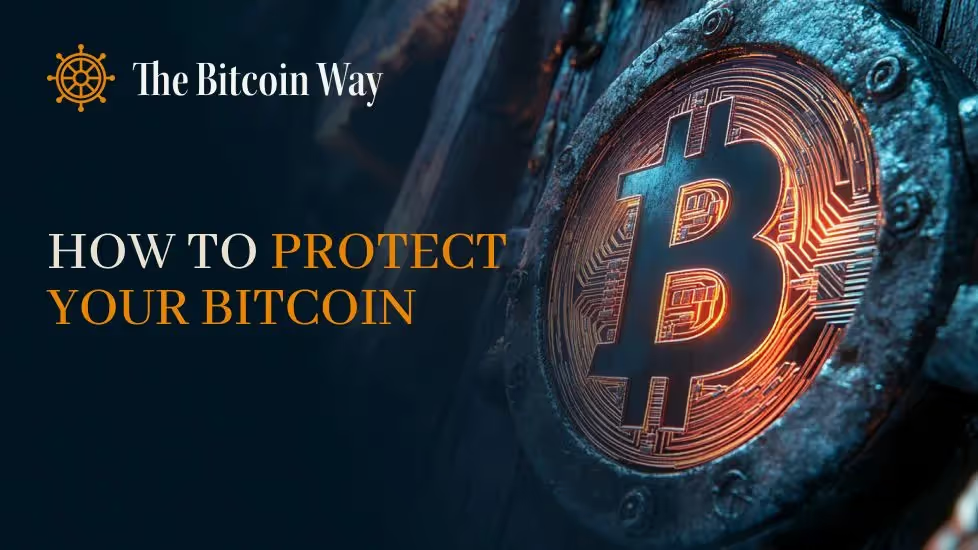How to Protect Your Bitcoin: A Complete Beginner's Guide

In this article:
How to Protect Your Bitcoin: A Complete Beginner’s Guide
Owning and using bitcoin gives you more financial freedom, but it also means taking full responsibility for its security.
If your wallet gets hacked or stolen, your bitcoin is lost for good. That’s why understanding how to protect your bitcoin is so important.
In this guide, we’ll take you through the best practices for bitcoin self-custody and personal cybersecurity you should embrace to protect your digital wealth.
Quick Overview
- It’s your responsibility to understand how to protect your bitcoin.
- Use secure air-gapped hardware wallets instead of hot wallets.
- Protect yourself from phishing and social engineering attacks with strong passwords, two-factor authentication (2FA), and proper seed phrase backups.
Why Do You Need to Protect Your Bitcoin?
Bitcoin is decentralized. There’s no centralized authority behind it to turn to for customer support if something goes wrong. You are fully responsible for keeping your funds secure. If you lose access, you are highly likely to lose your bitcoin forever.
Meanwhile, given bitcoin’s growing value, it is increasingly becoming an attractive target for hackers, scammers, and thieves.
Some of the most common risks include:
- Exchange failures: BTC exchanges can experience insolvency, security breaches, or technical issues that can result in users losing their funds. A good example is the FTX collapse in late 2022, which left many investors unable to withdraw their assets.
- Compromise of personal devices: Hackers can target your computer and smartphone by using malware or viruses to steal your private keys or passwords, putting your funds at risk.
- Social engineering attacks: Scammers can use fake websites, phishing emails, or SIM swap attacks to trick you into sharing sensitive information that could allow them to drain your BTC wallet.
- $5 wrench attacks: Attackers can target you in person and force you to hand over your wallet keys to them in what is known as a $5 wrench attack.
Being aware of these risks is key to protecting your bitcoin and making sure your investment stays secure.
“Bitcoin gives you complete control over your money, but with that control comes real responsibility. If you don’t take the security of your bitcoin seriously, there’s no one else to do it for you. Protecting your bitcoin is the single most important step to take,” explains Tony Yazbeck, co-founder at The Bitcoin Way.
7 Best Practices to Follow to Protect Your Coins
Now that you understand why you need to protect your bitcoin, let’s take a look at best practices you should follow to keep your coins safe.
Choose the Right Wallet
Choosing the right wallet is the first step toward protecting your coins. Hot wallets, which are connected to the internet, are generally vulnerable to attacks. For safer, long-term storage, it's best to use hardware wallets (ideally, air-gapped wallets). These wallets keep your private keys secure as they are designed to sign transactions offline. They secure your private keys even when your device gets compromised.
Use Strong Passwords
One of the simplest but most important ways to protect your bitcoin is to use strong and unique passwords on your digital currency-related accounts and wallets. A strong password is a combination of letters, numbers, and symbols. You should avoid reusing passwords or using easy-to-guess phrases.
Enable 2FA Everywhere
Always enable two-factor authentication (2FA) wherever possible. You should especially prefer using time-based one-time password (TOTP) apps or hardware keys instead of SMS codes. This adds an extra layer of security by requiring a second form of verification before anyone can access your account, even if they have the password.
Keep Up With Software Updates
Keeping your software up to date ensures you get the latest security updates and performance improvements. Hackers tend to exploit outdated applications, browsers, extensions, and operating systems.
Software updates can prevent common security problems and include new features that help to keep your wallet secure. Always enable automatic software updates, especially for your BTC wallet, to keep your wallet environment safe.
Avoid Using Public WiFi
Public Wi-Fi networks, like those in airports, cafes, and hotels, are common targets for hackers. Scammers can create fake access points to trick users into connecting, allowing them to steal login details, passwords, or even seed phrases.
If you absolutely must go online, use a trusted VPN and avoid entering any sensitive information. However, with bitcoin, it’s always better to wait than to risk losing everything.
Securely Back Up Your Seed Phrase
Keeping a secure backup of your wallet seed phrase can protect you from common mistakes and hardware failures. If your computer or phone gets compromised, lost, or stolen, the seed phrase allows you to recover your coins safely.
You can make several offline copies of your seed phrase and store them in separate secure places. The seed phrase should be recorded on paper or metal seed phrase storage and kept in safes or safe deposit boxes, and never digitally or in the cloud.
Cybersecurity Tips for Bitcoin HODLers
Smart personal cybersecurity habits are key when it comes to protecting your bitcoin. The small steps you take can make a big difference in protecting your bitcoin from theft or loss.
Here are a few key personal security measures that you should embrace as a BTC holder:
- Don't overshare information about your bitcoin ownership: Don’t share details that could reveal your holdings or identity, as this can make you a target for hackers, scammers, and even physical robbers.
- Avoid fake websites and social engineering attacks: Always be on the lookout for fake websites, phishing attempts, and other social engineering attacks designed to trick you into giving up sensitive information.
- Protect devices from malware and keyloggers: Protecting your devices is a crucial part of personal cybersecurity. Using antivirus software and firewalls can help keep malware and keyloggers, which can secretly capture your passwords and private keys, off your computer and phone.
- Secure your personal data and privacy online: You can safeguard your personal data and online privacy by being cautious about what you share publicly.
- Use a new address for new transactions: One of the easiest ways to improve your bitcoin privacy is to use a new address each time to receive BTC. This isolates all your transactions and makes it difficult to track your identity and total holdings since each deposit is stored in a separate address within your wallet.

What Should You Do If Your Bitcoin Is Compromised?
If you suspect your Bitcoin wallet has been compromised, whether through hacking, stolen private keys, or a phishing attack, it’s important to act quickly.
Here are some of the things you can do:
- Confirm the breach by carefully checking your wallet’s recent activity. Look for unauthorized transactions, unfamiliar wallet addresses, and changes to account settings.
- Create a new, secure wallet and transfer all your remaining funds to it. Don’t reuse the compromised wallet or any associated credentials, as hackers may still have access to it.
- Contact your bitcoin exchange or wallet provider (if you used a custodial wallet) and notify them of the hack, requesting that they temporarily freeze your account (if possible) and any unauthorized transactions or withdrawals.
- Review all your major accounts and update your passwords to keep them secure. If you're using SMS-based 2FA, switch to an authenticator app immediately.
- Report the incident to your local authorities by filing a report, as it can help with recovery efforts and insurance claims, if applicable.
- Closely monitor your account over the next few days for any unusual activities and set up alerts where possible.
Protecting Your Bitcoin With The Bitcoin Way
If you want to learn how to protect your bitcoin, it’s best to consult professionals who have specialist, relevant expertise. This can help you avoid costly mistakes.
The Bitcoin Way can offer you personalized guidance on how to protect and secure your BTC holdings.

FAQs
How do I keep my bitcoin safe?
You can keep your bitcoin safe by using a hardware wallet to safeguard your private keys, create strong passwords, and enable two-factor authentication for all related applications. Additionally, you can keep backups of your seed phrase offline, avoid using public Wi-Fi when accessing your BTC wallet, stay cautious of scams, and never share your private keys.
Can someone steal my bitcoin if they have my wallet address?
No, someone cannot steal your bitcoin by simply having your wallet address. Your wallet address is a public address used for receiving funds, while access to your BTC holdings requires your private key. However, if someone gains access to your private key or seed phrase through malware, phishing, scams, or social engineering attacks, they can steal your funds.
How do I protect my bitcoin from hackers?
The best way to protect your bitcoin holdings from hackers is by using a cold wallet to keep your private keys offline. You can also incorporate other security measures, such as using strong passwords, enabling two-factor authentication on your accounts, keeping your devices secure with antivirus software, and keeping up with software updates for your Bitcoin-related software.
